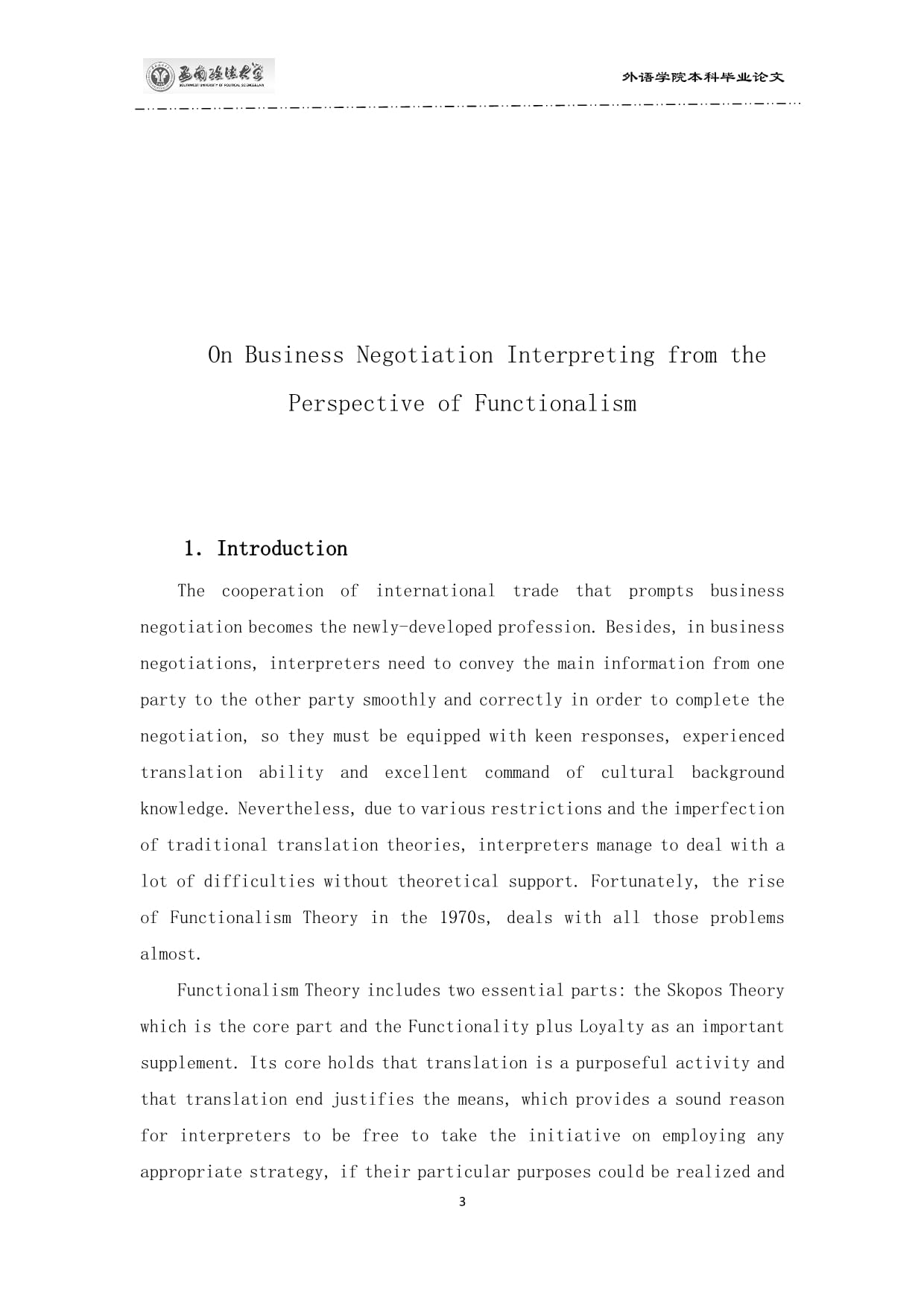




版权说明:本文档由用户提供并上传,收益归属内容提供方,若内容存在侵权,请进行举报或认领
文档简介
iContents摘要………………1Abstract…………21.Introduction……………………32.BriefIntroductionofFunctionalism……42.1TheSkoposTheory……………42.2TheFunctionalityplusLoyalty…………………53.BriefIntroductionofBusinessNegotiationInterpreting…63.1TheFeaturesofBusinessNegotiation……73.2TheDifficultiesofBusinessNegotiationInterpreting……………84.GuidetoBusinessNegotiationInterpretingfromFunctionalismPersp104.1FromtheSkoposTheoryPerspective……114.2FromtheFunctionalityplusLoyalty……………155.Conclusion…………………16 外语学院本科毕业论文摘要随着经济的发展与科技水平的进步,中国与世界其他国家贸易合作变得越来越密切。继中国成为世界第二大经济体之后,在国际贸易中占有举足轻重的地位,那么商务谈判也就成为了重中之重。由于各国之间还存在着语言和文化等方面的差异,口译人员在涉外商务谈判中扮演着重要角色。他们用自己的双语知识、跨文化知识、涉外商务和涉外法律等方面的专业知识帮助不同国家的企业谈判人员进行沟通并达成共识或签订合同。口译人员翻译时应根据谈判所要达到的目的,使用符合商务谈判特殊环境下的表达方式,使译文符合目的语接受者的表达习惯。功能主义翻译理论认为译者应根据不同的翻译目的采用相应的策略,这恰好满足商务谈判特殊的环境以及其确定的目的。功能主义翻译理论包含目的论和忠实原则两部分,这不仅为译者提供了灵活的翻译理论基础,使沟通更加顺畅,同时也约束译者忠实于谈判者的意图,从而使商务谈判顺利进行。因此,唯有在功能主义理论的指导下,方可避免或者减少由语言障碍和文化差异给商务谈判口译带来的实际困难,从而最终促进商务谈判成功,达成合作,实现利益的最大化。关键词:商务谈判;商务谈判口译;功能主义翻译理论;语言障碍;文化差异AbstractWiththerapideconomicdevelopmentandtheimprovementofscienceandtechnology,tradecooperationandcommunicationspringupfrequentlybetweenChinaandothercountriesandregions.AfterChinahasbeenthesecondeconomy,itholdsasignificantpositionininternationaltradeandcommerce,thus,businessnegotiationwillbefarmoreimportant.However,duetolanguagedifferenceandculturaldistanceamongthemajorcountries,interpreters,whohelpnegotiatorswiththeirbilingualknowledge,cross-culturalknowledge,professionalknowledgeofinternationalbusinessandlegalaffairstoreachagreementsorenterintocontracts,areindispensableinbusinessnegotiation.Accordingtobusinessnegotiation,interpretershavetoapplyproperwaysthatcomplywithbusinessnegotiationtomaketargetlanguagelistenersunderstandwhattheyhavesaid.Functionalismtheorygivesusameansthatinterpreterscanvarytheirstrategieswiththeirpurposesoftranslation,whichexactlymeetstheneedsofbusinessnegotiationandcompletesthesegoals.Functionalismtheorycontainstwoparts:theSkoposTheoryandtheFunctionalityplusLoyalty.Thus,functionalismtheoryprovidesbusinessnegotiationinterpretingwithvarioustranslationtheories,makingcommunicationeasier,andpreventsinterpretersfromgoingagainstthenegotiators,leadingtosmoothprogressofthenegotiations.Onlywiththeguidanceoffunctionalismtheory,canwereduceorevenavoidthedifficultiesthatcomefromtheinterpretationbecauseoflanguagebarrierandculturaldifference,whichwillpromotebusinessnegotiationssuccessfulandreachagreements,maximizingthebenefits.KeyWords:BusinessNegotiation;BusinessNegotiationInterpreting;FunctionalismTheory;LanguageBarrier;CulturalDifferenceOnBusinessNegotiationInterpretingfromthePerspectiveofFunctionalism1.IntroductionThecooperationofinternationaltradethatpromptsbusinessnegotiationbecomesthenewly-developedprofession.Besides,inbusinessnegotiations,interpretersneedtoconveythemaininformationfromonepartytotheotherpartysmoothlyandcorrectlyinordertocompletethenegotiation,sotheymustbeequippedwithkeenresponses,experiencedtranslationabilityandexcellentcommandofculturalbackgroundknowledge.Nevertheless,duetovariousrestrictionsandtheimperfectionoftraditionaltranslationtheories,interpretersmanagetodealwithalotofdifficultieswithouttheoreticalsupport.Fortunately,theriseofFunctionalismTheoryinthe1970s,dealswithallthoseproblemsalmost.FunctionalismTheoryincludestwoessentialparts:theSkoposTheorywhichisthecorepartandtheFunctionalityplusLoyaltyasanimportantsupplement.Itscoreholdsthattranslationisapurposefulactivityandthattranslationendjustifiesthemeans,whichprovidesasoundreasonforinterpreterstobefreetotaketheinitiativeonemployinganyappropriatestrategy,iftheirparticularpurposescouldberealizedandmakeanyreadjustment;ifitisneededtorecognizetheintendedtargettextfunction(HuangYun,2011).Nowadays,mostoftheresearchesonbusinessnegotiationinterpretingarediscussingtheadvantagesanddisadvantagesofstrategiesormethods,whicharetakeninbusinessnegotiation(WangJianhua,2007).However,inthispaper,accordingtothetwospecificproblemsorissuesinbusinessnegotiationinterpreting:languagebarrierandculturaldifference,theauthorwillexplorehowtoadjustmethodstosolvethedifficultiesandimprovethequalityofbusinessnegotiationinterpretingfromFunctionalistapproachperspective.AsthereislackinginresearchesonthecombinationofFunctionalismandbusinessnegotiation,theauthorhopesthatthispaperisagoodexampleandwilleffectivelydealwiththetwochallenge—languagebarrierandculturaldifference.2.BriefIntroductionofFunctionalism2.1TheSkoposTheoryAswehavementionedintheabovepartthatFunctionalismhasexperiencedfourperiods.Inthefirstperiod,GermantranslatorReissfirstputforwardTextFunctionalismTheoryasacriterionfortranslationcriticism.Shethoughttheconcretetranslationshouldbeprovidedincaseforspecialdemand(JiaXue,2013).Wecangetthepointthattranslatedtextsaretranslatedorinterpretedbytherestrictionofthepurposeofthesourcetext.Afterwards,H.J.VermeershowedhisapprovaltothisideaandcameupwiththeSkoposTheorywhichwastotallydifferentfromthetraditionaltranslationtheories.Heheldtheideasthatthefunctionoftranslationorinterpretationwasthatthetargettextsandsourcetextswoulddothesameimpactonandgetthesamereactionofreceivers.Moreover,translationwasacommunicativeactivitywithsomekindofpurpose,whichmeanttranslationendjustifiesthemeans.(Nord,2001:112).Thatistotallyseparatedfromthetraditionaltranslationtheories,especiallytheEquivalenceTheory.Inaddition,MantaribuilttheTheoryofTranslationAction.Itlooksupontranslationasamorecomplicatedactivityandproposesaseriesofinfluentialrolessuchasinterpreters,initiators,andreaders(orreceivers)(JiaXue,2013).Herviewfurtherexplainsthatpeople’sactionisimpliedwithacertainpurposeinaspecificoccasion,whichindicatesthattheTheoryofTranslationActionhelpsusavoidlimitingintheinformationofsourcetextandtopaymoreattentiontoallrelevantparts.Whenthetargettextisintendedtoachieveapurposeorfunctionotherthaneverythingoftheoriginalandwhenthetargettextaddressesaudienceswhicharedifferentfromtheintendedreadershipoftheoriginal,theSkoposTheoryisthebestchoiceforbusinessnegotiationstoachievetheirgoalsthatarerealizingbenefitmaximization.Inotherwords,adequatetranslationshouldbe“adequateto”therequirementsofthetranslationbrief.WithintheframeworkoftheSkoposTheoryanadequatetranslationisgoal-orienteddeterminedbytheskoposofthetranslation.Thus,theSkoposTheorycanguidethebusinessnegotiationinterpretingeffectively,whichwillfinallyaccomplishthegoalsofbusinessnegotiations.3.BriefIntroductionofBusinessNegotiationInterpretingSinceitsentryintotheWTOin2002,ourcountryhasquickenedthepaceofsteppinginlinewithinternationalstandardsinsuchfieldsaseconomyandtrade.AdevelopingChinawill,asalways,generatecooperationopportunitieswithothercountriesaroundtheworldforachievingwin-winsituation,thus,businessnegotiationbecomesmoreandmoreimportant.WehavetoimprovethequalityofbusinessnegotiationinterpretingsoastopromotecooperationandmaximizeprofitsunderthedirectionofFunctionalismTheory.However,businessnegotiationisavolatileandcomplexprocess,sotranslatorsorinterpretershavetoreorganizetheirlanguageinordertoadjusttheirtranslationtothetargettext.Successfulbusinessnegotiationistheresultofbothpartiesperformedwellwiththelanguagethatinterpretersapplyineveryappropriatewaytoexpressnegotiators’realintention.Therefore,theyshouldknowwellhowtodealwithunpredictablechallengebutthecommonsituation,andtomanagethetwodifficulties:languagedifferenceandculturaldistance,inbusinessnegotiation.3.1TheFeaturesofBusinessNegotiationInbrief,businessnegotiationisaprocessthatinordertocoordinatetherelationshipbetweenbusinessandmeettheirneeds,peopletrytofindafinalsettlementofthedisputeandreachanagreementandsignthecontractthroughtheconsultationandthedialogue(PuLijing,2011).Moreover,Businessnegotiationisacollectionofpolicy,technologyandartistryinsocialandeconomicactivities,sotheauthorthinksthatitcanbecharacterizedinthefollowingfiveaspectsbasedonitsdefinition.First,itisaprocessofcompromise.Inabusinessnegotiation,theremustbesomeconflictsandcontradictionsasboththepartiesstandfordifferentinterests.Onlywhentheyadjusttheirownneedsandinterests,cantheyreachanagreementwithconcessionsandcompromises.Second,businessnegotiationisacontradictoryunityonbothcooperationandconflict.Withoutconflicts,thereisnonegotiationbetweenbothparties.Thus,thesuccessofbusinessnegotiationisgoodforbothparties,awin-winsituation.Inbusinessnegotiation,anypartyofthemwillconsidertheirowninterestsfirstly.Andtheyhavetosacrificetheirowninterestsappropriatelyinordertoachievecooperateonabovepromise.Third,businessnegotiationbenefitsbothpartieswithoutequality.Itistruethattherearemanyrivals,sothenegotiatorshavetousetheirstrengthstogetthebestinterests.Andtheyshouldhaveprofessionalqualitiesthathelpthemtoinchargeofthenegotiation.Fourth,thepurposeofthebusinessnegotiationistoenterintocontractsorcooperativerelationship.Asamatteroffact,itsultimategoalisthatnegotiatorsgainthemaximizationofeconomicbenefits,sotheytakethepricenegotiationsasthecentraltaskofthebusinessnegotiation.Therefore,theywilltrytheirbesttomaximizethegreatestinterests.Fifth,forinterpretersthemostdifficultpartinbusinessnegotiationisthattimeislimitedandurgent.Inbusinessnegotiation,negotiatorswouldliketofightfortheirbenefitwithanychanceandtoreachagreementswiththeirpartnersassoonaspossible,gainingthebestvalue.Basedontheabovefive,wecanfigureoutthatthemostdifficultchallengesonbusinessnegotiationinterpretingarethatinterpretersmustdealwithlanguagebarrierandculturaldifferenceincomplicatedandvolatilebusinessenvironmentassoonaspossible.Thus,wewillfurtherdiscussthetwodifficultiesofbusinessnegotiationinterpretinginthenextpart.3.2TheDifficultiesofBusinessNegotiationInterpretingTheessenceofbusinessnegotiationisthatinterpretersuselanguagethatreceiverscouldhaveabetterunderstandingtoconveythemainideasorattitudeofspeakers,resultinginwin-winsituationthroughtheirinterpreting.Thus,interpretersneedtomasterthefeaturesofbusinessnegotiationssothattheycanadjusttheirwaystoaccomplishtheirtasks,whichwillhelptomakebusinessnegotiationgosmoothlyandenterintoagreements.BusinessNegotiationinterpretingisanactofinterculturalcommunication,andamorecomplicatedformofcommunication,becauseduringtheprocessthecontentofonelanguageistransferredintothatofanotherwhichcontainsdifferentcultures.Notonlylinguisticbarriersbutalsoculturalgapwillcomeintoexistence(WangLingjun,2010).Inotherwords,businessnegotiationinterpretingisnotonlythetransferencefromonelanguagetoanother,butalsoaformofspecialcommunicationtheinterpretercoordinatesexchangesbetweenparticipantswithdifferentlanguagesandcultures.Besides,asweallknow,interpretingtosomedegreeismorepracticalthantranslation,especiallybusinessnegotiationinterpretingbecauseofthecharacteristicsofbusinessnegotiation.AlthoughFunctionalismTheoryprovidesasolidtheoreticalorientation,theprocessofabusinessnegotiationisquitecomplex,unpredictable,andcouldbeimpactedbylargeamountsoffactors.Thus,itisverydifficultforinterpreterstoovercomethetwodifficulties—languagebarrierandculturaldifferenceduringbusinessnegotiationinterpreting.Languageisakindoftoolthatpeoplecannotonlyexpressideas,butalsoconveyemotions,solanguageservesasacruciallinkbetweenbothpartiesinabusinessnegotiation.Andlanguagesarebasedontheconcepts,experiences,andviewsandsoon.Thus,languagebarrierisinevitableinanyinterpreting,asdifferentlanguageshaveformedtheirownfeatures,suchaspronunciations,syntacticstructure,institutionalizedexpressions,andsoon,andwhichwillhaveagreatinfluenceonbusinessnegotiationinterpreting.Themostdifficultpartisthatbusinessnegotiationinterpretingisgreatlyprofessional.Thelanguageofbusinessnegotiationincludeslinguisticform,vocabulary,andcontent,whicharecloselyrelatedtoitsprofession.Besides,businessnegotiationlanguageemphasizessimplicityandformalspecification,embodyinginternationalcommonality(ChuYanshan,2014).Nevertheless,negotiatorscanbeeasilybrokendownduetoalackofmutualunderstandingoflanguage,whileFunctionalismTheorywillmotivatetheinterpreterstofightforbetterresultsinbusinessnegotiation.Specially,culturaldifferenceisverydifficultasitisimpossibletoacquirethroughexercises.Cultureissocomplexandubiquitousthatalmosteveryaspectofhumanlifeistouched,shapedbyculture.OneofthewidelyreceiveddefinitionsofculturewasformulatedbytheEnglishanthropologistEdwardTaylor,whichisusedinEncyclopediaBritannica(1983).“Culture…isthatcomplexwholeincludesknowledge,belief,art,law,morals,custom,andanyothercapabilitiesandhabitsacquiredbymanasamemberofsociety.”(WangLingjun,2010)Thus,Cultureisreflectedincommunicationpractices,andatthesametime,communicationpracticesshapeculturallife,thatis,wecanfindoutthatbusinessnegotiationsinterpretingandculturecannotbeseparatedfromoneanotherbecauseeachinfluenceseachother.Culturecaninfluencenegotiatingstylesindifferentways,becausenegotiatorsfromanothernationaredifferentinlanguage,belief,behaviorsmanners,andwayofthinking,valueandattitudesandsoon.Differentculturesexpressdifferentwaysofdoingbusiness(PuLijing,2011).Anditismuchmoredifficultthanlanguagebarrier,asitcontainssomanyaspectsofsociallifeandisaffectedbythose.However,Functionalistapproachprovidesasolidtheoreticalbasisforsolvethetwoproblemsofbusinessnegotiationinterpreting.Asinterpretingisare-creativeprocess,onthebasisofFunctionalistapproach,listenersarethedecisivefactor.Likethatinbusinessnegotiationinterpreting,theotherpartyofbusinessnegotiationisthefactorthataffectstheinterpretation.Thus,whetherthebusinessnegotiationcangosmoothlyandwhetherthecooperationcancometoagreementsaredecidedbywhethertheotherpartyofbusinessnegotiationgetstherealintentionofthepartnerthroughtheinterpretation,whichmeansinterpreterswhowanttocompleteinterpretingwellandovercomethetwodifficultiesofbusinessnegotiationsinterpretingmustinterpretundertheguidanceoftheSkoposTheoryandtheFunctionalityplusLoyalty.4.GuidetoBusinessNegotiationInterpretingfromFunctionalismAsinterpretersarequalifiedwithenoughsubjectivityandcreativity,goodperceptionofintentionality,andexcellentemotionalmanagement,theycancopewithcomplexandvolatilebusinessenvironmentandunpredictablechallengesinbusinessnegotiationinterpreting.Besides,inordertomaximizeprofits,theycantrytheirbesttoovercomethetwodifficultiesofbusinessnegotiationinterpretingwiththedirectionofFunctionalistapproachandregulatetranslationstrategieswhichhelpthemtomakecooperationwiththeother.Asamatteroffact,FunctionalismTheoryisthebestwaytobusinessnegotiationinterpretingthatisinstanttranslationincross-culturalandcomplexanduncertainenvironment,anditdoesstressthepurposeofbusinessnegotiationbutthebeautyofinterpretation.Furthermore,thegoalofbusinessnegotiationinterpretingistohelpboththepartiestoreachconsensuses.Thatistosay,businessnegotiationsbymeansofinterpretingachievetheircommunicationalaimandthenrealizethemaximumofinterests.Tosumup,wecanfindoutthatonlyundertheguidanceofFunctionalismTheory,canbusinessnegotiationinterpretingbenefitbusinessnegotiationandgainmutualprofits.Moreover,onlywheninterpretersgettherightpointofspeakersandtheirinterpretationareorientedbytargetlanguagelistenersbasedonFunctionalismTheory,cantheyplayascommunicativebridgetofacilitatebusinessnegotiation.JustastheideasofFunctionalism,theonlyandfinalpurposeofinterpretingistomakethediscussionsuccessful.Inthefollowingpart,theauthorwillexplorehowtoovercomethetwodifficultiesinpractice:languagebarrierandculturaldifference,withthedirectionoftheSkoposTheoryandtheFunctionalityplusLoyalty.4.1FromtheSkoposTheoryPerspectiveTheSkoposTheory,asthecoreofFunctionalismTheory,providestheatricalevidenceforinstructinginterpreterstomeasurechangingcomplicatedbusinessenvironment.Indeed,therearemanyinterpretingstrategiessuchasaddition,omission,alteration,andreorganization,forinterpreterstosettleconflictsanddifficultiesinbusinessnegotiationinaccordancewiththeSkoposTheory.Atvariousdegreesmanyscholarshaveexpressedtheirpersonalopinionsorviewsontheseissuesandsharedtheirstrategies,andmostofthemareforcedonthestrategiesthemselves.However,weshouldknowthatallthesestrategiesareusedtosolvethetwomainproblemsinbusinessnegotiation.Therefore,theauthorwouldtalkabouthowtodealwiththetwomaindifficultiesratherthanspecificstrategiesofbusinessnegotiationinterpreting.Eventhoughtheinterpretersmasterthevariousstrategies,theymayhavenoideaaboutwhichstrategyisthebestoneandwhytheyshouldapplythatonebutothers.Besides,thepurposesofthebusinessnegotiationsaretoreachagreementsbutthesenseofbeautylikeliterarytranslation.Consequently,interpretersshouldfollowtheprinciplethatfulfillsthepurposeofbusinessnegotiationfirstandflexiblyprocessmeasuresandstrategiesforrealizingthemaximumofinterests.4.1.1TheEliminationofLanguageBarrierLanguage,indifferentsocialcommunities,hasitsownfeaturesorcharacteristicsaswehavenotedtheabove,suchas,pronunciation,syntacticstructure,institutionalizedexpression,andsoon.Thus,interpretersmustfollowtherulesofthetargetlanguage.Besides,asaffectedbytheirownhabit,peopleindifferentculturalbackgroundswillhavevariouswaystospeak,andtheywillholdvariousviewsonthesamethingsorexpressions.Inadditionnegotiatorsindifferentculturalbackgroundmayusuallyemploycontraryorentirelydifferentmethodstosharetheirthought.Interpretersmaynotonlymasterthefeaturesoflanguage,butalsorealizethattheyshouldshowtheinformationinthewaythatfitsthehabitoftargetlanguagereceivers.Moreover,theyshouldclearwhatisthespeakers’realintention,andthentaketheirinformationintoanotherlanguageinabetterwaywiththeSkoposTheoty’sdirection.Asmentionedbefore,theSkoposTheotymakesthepurposeofbusinessnegotiationclear,sonomatterinwhatway,aslongastheycanrealizemaximizedprofits.Forexample,(1)Inabusinessnegotiation,arepresentativeoftheAmericanpartyhopedthathispartnerscouldensureproductqualityandwhenhereferredtoacompanythatcooperatedwithhisfirmago,hesaid,“Thecompanycutcornersonthenewproductbyusinglessexpensivepartinthedesign.”(ChuYanshan,2014)Thentheinterpretersaid,“那家公司再这个新产品生产上偷工减料,他们再设计中使用廉价的零件。”Asisknowtoall,“cutcorners”hasabasicmeaning,doingsomethingthecheapestoreasiestway.Inthissituation,iftheinterpreterwantstodealwithlanguagebarriersoastostateclearwhattherepresentativeofAmericanpartymean,hemustwellmastertheinstitutionalizedexpressionofthetargetlanguage,becausethesameexpressionstandsfordifferentmeaningsinvariouscontests.Combiningwith“usinglessexpensivepartinthedesign”andhislinguisticknowledgereserve,hecangetthepointof“cutcorners”,whichischeatingonworkmanshipandmaterials.Finally,hecanconveytherepresentative’sblameonthatcompanyandwarningtotheChinesepartythroughtranslatinginto“偷工减料”undertheguidanceoftheSkoposTheory.OnlyhehasastrongunderstandingofthelinguisticknowledgeofthetargetlanguageandinterpretswiththedirectionoftheSkoposTheory,canheeliminatelanguagebarrier.Ofcourse,thelanguageofbusinessnegotiationisveryprofessional,sointerpretersmusttranslateasexactaspossible.Now,let’slookatanexample.(2)ThebackgroundisthattheChinesepartywantstheirpartnertodelivertheproductsooner,sooneoftherepresentativesay,“我方要求贵方迅速交货。”(ChuYanshan,2014)Theinterpreterstranslatesintoweaskforshortdeliveryforourorder.Indeed,thereisnomistakeinliteralmeaning,butweshouldknowthatthroughexperience,somewordshavetheirownuniquephraseology.Forthisreason,theinterpretercannotinterpretwithhisownunderstandingandhabitbuttakethetargetlanguagepartyasfirstprincipleundertheguidanceoftheSkoposTheory.Hehastointerpretbasedontherulesofthetargetlanguage,sohisinterpretationshouldbethatweaskforpromptdeliveryforourorder.TheSkoposTheoryremindinterpretersofregardthegoalsofbusinessnegotiationasfirst,whichwillhelpthemtoovercomelanguagebarrier.4.1.2ReduceCulturalDifferencesAsweallknowthatcultureistheformationandevolutionofhistoricaldevelopmentcreatedbyallnatures,especiallyhumanbeings,whichischaracterizedbycertainmembersofanygivengroups.Forbusinessnegotiation,thetwopartiesindifferentculturalbackgroundmeeteachotherforcommonbenefits,withtheirownparticularlanguage,customsandvalues.Whatcaninterpretersdoiftheyencounterpotentialproblemscausedbyculturalconflictsduringbusinessnegotiation?TheSkoposTheorycanteachinterpreterstoguaranteetherealizationofcontextualpurposesduringthebusinessnegotiation(Fan,2012).Thefollowingishowitworks.Thereisanexampleoninstitutionalizedexpression,whichwillhelpustocomprehendthissituation.ThebackgroundisthataChinesegovernmentisnegotiatingwithanAmericaninvestmentcorporation,tryingtopersuadethemtoofferChineseinvestment.Duringthenegotiation,aChineserepresentativesays,(3)“建立一条龙服务中心,为外国投资者提供审批业务。”Theinterpreterthentranslatesitinto“Setuptheone-dragonservicecentertoprovideacoordinatedprocessserviceforforeigninvestorsinobtainingapproval.”(LaiHengjinh,2004) Theinterpreterinterprets“一条龙服务”as“one-dragonservice”,whichisalmostimpossibleforAmericanrepresentativestounderstandwhatitisaboutbecauseofculturaldiffierence.AccordingtotheSkoposTheory,thepurposeofthespeakerguidestheinterpretertotranslate.YettherealintentionofthespeakeristotellthelistenerthattheChinesegovernmenthasacompleteservicesystemandwilltrytheirbesttosecureAmericans’investmentsothattheyhavenothingtoworryaboutinvestinginChina.Therefore,whattheinterpretershoulddoisthathehelpstoconveytherealintentionandpromiseoftheChineserepresentatives,whichwillgiveagoodversionandimpressiontoAmericanmembers.However,theinterpreterfailstoexpresstheoriginalmeaningasalackofrelativecultureofthetargetlanguage.IfheinterpretsundertheguidanceoftheSkoposTheory,hewouldgetridoftherestrictionofthesourcelanguage.Hereisanotherexample.AChinesecompanyimportingsomegoodsfromtheUnitedStateswasnegotiatingwithaforeignexporter.Whenitcametothekeypartofpaymentterms,aChineseimportersaid,(4)“我们不会给你们打白条子,我们会按时付款的。”Theinterpreterthensaid,“Weshallnotissueblankpapertoyou.Wewillpayyouontime.”(Lai,2004)Afterhisinterpretiation,allforeignnegotiatorsgotconfusedaboutwhattheChinesepartymeant.Whatmakesthemisunderstandingisculturaldistance,whichisthebiggestbarrierfornegotiatorsandinterpreterstocommunicatewell.Infact,iftheinterpretertranslationisorientedbytheUnitedStateslistenersinaccordancewiththeSkoposTheory,theconversationwillgosmoothly.Obviously,interpretersshouldinterpretwhatspeakerssayundertheguidanceoftheSkoposTheory.Onlyinthisway,cantheyconveytheinformationaccuratelyandthelistenerswillgettheirexpression,whichwillavoidculturedifferenceasmuchaspossible.5.ConclusionTranslationorinterpretationisaveryimportantacademicsectorforanycountryandeverytranslationtheoryhasitsuniqueadvantageandacademicvalue.However,theFunctionalismhasopenedanewperspectivefortranslationfiled,whichstressesthattranslationstrategiesandapproachesdependonitspurpose.Thus,itlaidasolidtheoreticalandpracticalfoundationtodealwiththetwomaindifficultiesofvarioustextualforms,especiallythebusinessnegotiations.Theultimategoalofbusinessnegotiationinterpretingistopromotediscussionmaximizingprofitswhiletheprocessisverycomplicatedanditinvolvesmanyaspectsoflifeduringthebusinessnegotiation.Therefore,theFunct
温馨提示
- 1. 本站所有资源如无特殊说明,都需要本地电脑安装OFFICE2007和PDF阅读器。图纸软件为CAD,CAXA,PROE,UG,SolidWorks等.压缩文件请下载最新的WinRAR软件解压。
- 2. 本站的文档不包含任何第三方提供的附件图纸等,如果需要附件,请联系上传者。文件的所有权益归上传用户所有。
- 3. 本站RAR压缩包中若带图纸,网页内容里面会有图纸预览,若没有图纸预览就没有图纸。
- 4. 未经权益所有人同意不得将文件中的内容挪作商业或盈利用途。
- 5. 人人文库网仅提供信息存储空间,仅对用户上传内容的表现方式做保护处理,对用户上传分享的文档内容本身不做任何修改或编辑,并不能对任何下载内容负责。
- 6. 下载文件中如有侵权或不适当内容,请与我们联系,我们立即纠正。
- 7. 本站不保证下载资源的准确性、安全性和完整性, 同时也不承担用户因使用这些下载资源对自己和他人造成任何形式的伤害或损失。
最新文档
- 单元定时检测(十五)生态脆弱区及其综合治理
- 承诺书之医院服务承诺口号
- 成长作文之成长的脚步作文800字
- 2024年技术服务项目发展计划
- 2024年保险监管相关保险服务项目发展计划
- 2024年油品脱砷特种催化剂项目建议书
- 2024年高性能特种合金材料合作协议书
- 2013年青海省西宁市中考英语试卷【解析版】
- 建筑施工现场临时用电及临建房屋管理培训课件
- 2022起重机产品验收标准
- 探秘微观世界课件
- 胆囊结石科普宣教
- 地暖使用手册
- 螺旋钢管的安装施工方案
- 《足球传接球》教学反思简短 足球传接球教案反思
- 江苏省宿迁市宿城区四所学校2023-2024学年六年级上学期期中数学试题
- 必修一第三章《细胞的基本结构》单元教学设计高一上学期生物人教版必修1
- 电镀制造成本预估表
- 劳动保护基本小常识
- 朱熹《春日》教学课件
- 新课程标准下的高中英语语法教学探讨

评论
0/150
提交评论